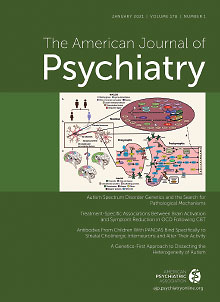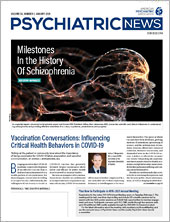In a year marked by a pandemic, national reckoning on race, and contentious presidential election, the American Journal of Psychiatry (AJP) maintained its commitment to publishing impactful mental health research and commentary. As the pandemic led to shutdowns across the country, the editors of APA’s flagship Journal worked swiftly to post accepted COVID-19 articles online. As people across the nation flooded major cities to protest police brutality and the deadly effects of systemic racism, the Journal editors took note.
“American psychiatry’s early years were marked by engagement in blatant systemic racism, the consequences of which remain evident today,” they wrote in an editor’s note published online in September 2020. “As editors of the Journal, we are determined to use the Journal as effectively as possible to present scientific and clinical information that will combat racism and its devastating effects on psychiatric care and mental well-being.”
At the end of each year, AJP editors each select one article they found particularly interesting, important, or impactful. The importance of diversity and inclusion in science was reflected in the 2020 pick by AJP Editor-in-Chief Ned Kalin, M.D.: “Reproducible Genetic Risk Loci for Anxiety: Results From ∼200,000 Participants in the Million Veteran Program.” Other topics highlighted by the editors included the mental health impact of COVID-19, climate change, and cannabis legalization (see box).
The study picked by Kalin describes one of the largest genomewide analysis studies (GWAS) for anxiety risk factors to date, which was made possible by the Million Veteran Program (MVP). The MVP is a national consortium establishing one of the largest biobanks in the world to understand how genes, lifestyle, and military experiences affect veterans’ mental and physical health. The MVP has recruited over 800,000 participants and obtained blood samples from over 300,000.
In addition to including over 200,000 DNA samples overall, the MVP study featured a diverse population pool, with DNA samples from over 24,000 Black veterans. The previous record holder in the genetics of anxiety was a U.K. GWAS involving about 30,000 people, nearly all White.
For the study, a research team from Yale University and the VA Connecticut Healthcare System compared participants’ genetic profiles with their responses on the two-item Generalized Anxiety Disorder scale (GAD-2). They identified six genetic variants that were linked with higher GAD-2 scores; five of these were specific to White participants (referred to in the study as European Americans), and one was specific to Black participants (referred to in the study as African Americans).
The African American–specific variant was located near a gene called TRPV6, which encodes a transport protein that regulates the absorption of calcium in multiple tissues, including in the brain. Dysfunctional calcium transport in neurons is believed to be implicated in schizophrenia. Though this variant was present in European Americans as well, it was extremely rare (less than 1%, compared with a 5.8% prevalence in African American samples).
“This study highlights the importance of including individuals from diverse populations in GWAS studies, as the variant identified to be potentially important in the African American population would not have been found if the sample was entirely constituted of individuals of European descent,” Kalin wrote in a discussion of his 2020 editor’s selection.
The five risk variants uncovered in European Americans may also pave the way for new lines of inquiry. One variant was near a gene called SATB1, which among many other duties, regulates the production of a hormone important for the body’s fear response. A second variant was linked to a gene called OPRL1, which is involved in the learning and memory of fear-related behaviors. Numerous studies have reported on how elevated stress and fear-associated memories contribute to anxiety behaviors, and this study may point to the genes responsible. A third variant associated with anxiety in European Americans was near the estrogen receptor, which may explain why more women are diagnosed with anxiety than men.
Kalin noted that despite anxiety being one of the most common mental health issues in America, the genetics of anxiety has been understudied relative to schizophrenia and major depression.
Joel Gelernter, M.D., the Foundations Fund Professor of Psychiatry at Yale and co-lead author of the
AJP study, told
Psychiatric News that scientists are likely to discover many more genetic variants related to anxiety soon. “For every field of genetic analysis, you eventually collect enough data to reach an inflection point that leads to rapid discovery,” he said. He cited a seminal study of
schizophrenia risk genes published in
Nature in 2014. In that study, researchers identified more than 80 genes associated with schizophrenia that had previously not been identified; since that time, dozens more have been uncovered.
“With the building blocks we have now made available for future studies, I think the inflection point for anxiety genetics is around the corner,” Gelernter said. “There is a rich vein of discovery just waiting to be tapped.”
The study by Gelernter and colleagues appeared in the March 2020 issue of AJP, right before the COVID-19 pandemic took hold in the United States. Since then, many more people have reported feelings of anxiety—whether related to the virus, social isolation, racial issues, and/or politics.
“We look forward to the availability of additional data from the Million Veteran Program, as larger GWAS studies will reveal additional genetic leads related to the risk to developing pathological anxiety,” Kalin wrote.
The study was supported by the Veterans Affairs Office of Research and Development and the VA Cooperative Studies Program. ■

